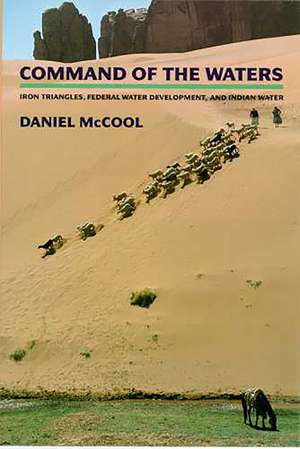Command of the Waters: Iron Triangles, Federal Water Development, and Indian Water
Autor Daniel McCoolen Limba Engleză Paperback – sep 1994
Much has been written about legal questions surrounding Indian water rights; this book now places them in the political framework that also includes water development. McCool analyzes the two conflicting doctrines relating to water use—one based on federal case law governing the rights of Indians on reservations, the other sanctioned by legislation and applied to non-Indians—based on the "iron triangles" of bureaucrats, legislators, and interest groups that dominate policy issues. He examines the way federal and BIA water development programs have reacted to conflict, competition, and opportunity from the turn of the century to the 1980s and updates the situation in an introduction written for this edition.
Preț: 189.45 lei
Preț vechi: 333.00 lei
-43% Nou
Puncte Express: 284
Preț estimativ în valută:
36.25€ • 38.77$ • 30.23£
36.25€ • 38.77$ • 30.23£
Carte indisponibilă temporar
Doresc să fiu notificat când acest titlu va fi disponibil:
Se trimite...
Preluare comenzi: 021 569.72.76
Specificații
ISBN-13: 9780816515028
ISBN-10: 0816515026
Pagini: 321
Dimensiuni: 152 x 229 x 20 mm
Greutate: 0.57 kg
Ediția:1
Editura: University of Arizona Press
Colecția University of Arizona Press
ISBN-10: 0816515026
Pagini: 321
Dimensiuni: 152 x 229 x 20 mm
Greutate: 0.57 kg
Ediția:1
Editura: University of Arizona Press
Colecția University of Arizona Press
Notă biografică
Daniel McCool is Professor of Political Science and Director of the American West Center at the University of Utah.
Recenzii
Will surely remain the best treatment of this important subject for some time to come." —Western Historical Quarterly
"Provides a clear and concise understanding of how water policy has been made in this century." —Water Resources Bulletin
"[A ] consistently high level of scholarship and careful application of contemporary public policy concepts to a significant public question." —Choice
"The juxtaposition of non-Indian and Indian water rights and projects is a special strength of the book, contrasting vividly the political power of the non-Indian water iron triangle with its necessary opposite, the powerlessness of the Indians." —Policy Studies Journal
"Will be particularly useful to readers looking into this complicated subject for the first time." —Public Historian "Exceptionally insightful, remarkably well written, and full of both excellent conceptualization and rich detail." —American Political Science Review
"Provides a clear and concise understanding of how water policy has been made in this century." —Water Resources Bulletin
"[A ] consistently high level of scholarship and careful application of contemporary public policy concepts to a significant public question." —Choice
"The juxtaposition of non-Indian and Indian water rights and projects is a special strength of the book, contrasting vividly the political power of the non-Indian water iron triangle with its necessary opposite, the powerlessness of the Indians." —Policy Studies Journal
"Will be particularly useful to readers looking into this complicated subject for the first time." —Public Historian "Exceptionally insightful, remarkably well written, and full of both excellent conceptualization and rich detail." —American Political Science Review
